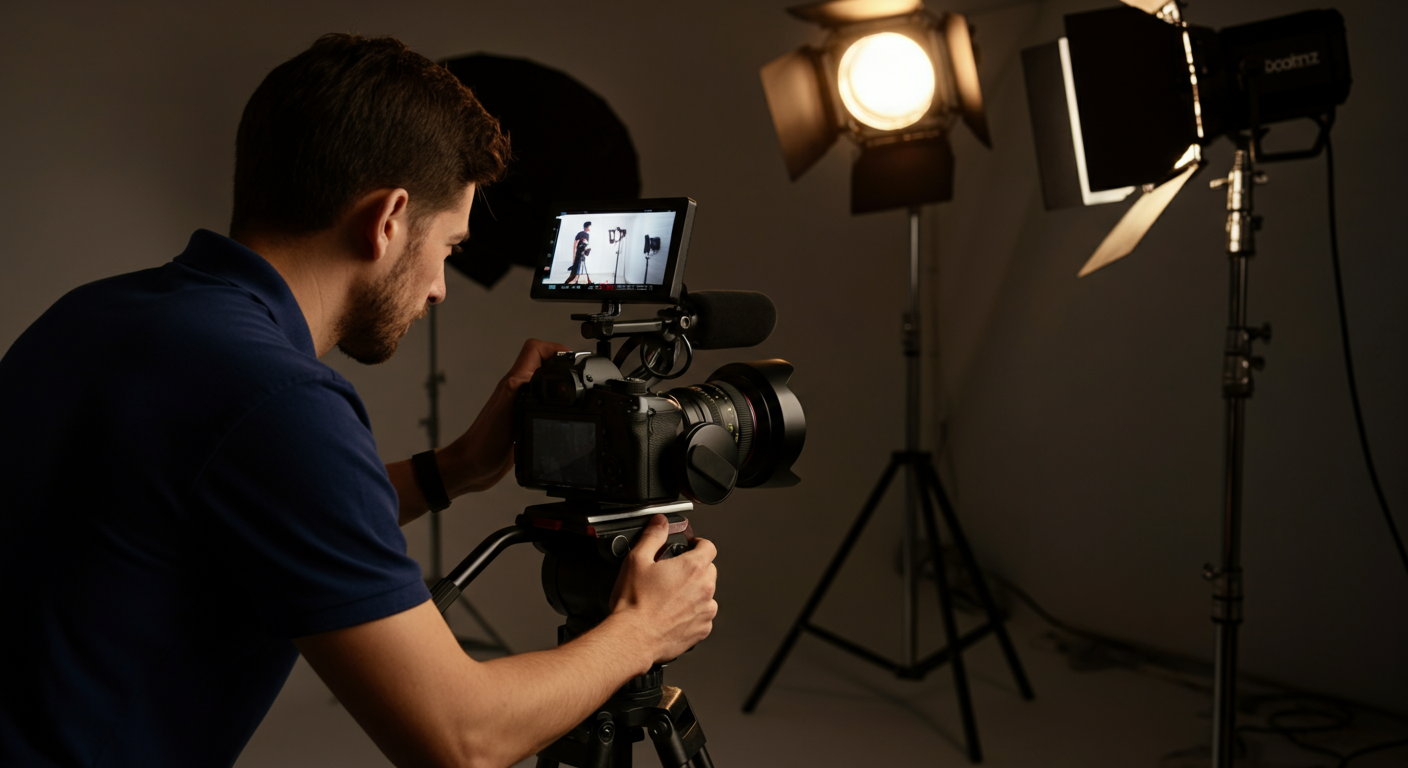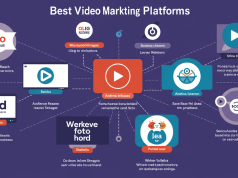Every scroll through social media reinforces the same truth: video content dominates. Brands across industries are racing to produce video content, but there’s a crucial distinction many miss. While anyone can create videos, only skilled marketing videographers understand how to transform brand messages into compelling visual stories that drive business results.
A marketing videographer brings specialized expertise that goes far beyond technical filming skills. They understand consumer psychology, brand positioning, and how different video formats perform across various platforms. Most importantly, they know how to create content that doesn’t just look professional—it converts viewers into customers.
What Makes a Marketing Videographer Different
Strategic Brand Understanding
Marketing videographers approach every project through a brand strategy lens. They don’t just capture footage—they translate brand values, personality, and positioning into visual narratives that resonate with target audiences.
Brand Voice Translation: They understand how to maintain consistent brand voice across different video formats, from 15-second Instagram Reels to 10-minute YouTube tutorials.
Audience Psychology: Marketing videographers study how different demographic groups consume video content and tailor their approach accordingly.
Business Objective Alignment: Every creative decision supports specific business goals, whether that’s increasing brand awareness, driving website traffic, or generating leads.
Platform-Specific Expertise
Different platforms require different approaches, and marketing videographers understand these nuances intimately.
YouTube Strategy: They know how to create content that performs well in YouTube’s search algorithm while maintaining high production values for longer-form content.
Social Media Optimization: From TikTok’s authentic aesthetic to LinkedIn’s professional tone, they adapt their filming and editing style to match platform expectations.
Mobile-First Approach: They understand that most video content is consumed on mobile devices and frame their shots accordingly.
Conversion-Focused Storytelling
While traditional videographers focus on visual aesthetics, marketing videographers prioritize storytelling that drives action.
Hook Development: They craft compelling opening moments that stop scrolling and engage viewers immediately.
Emotional Journey Mapping: They understand how to take viewers through emotional states that lead to purchasing decisions.
Call-to-Action Integration: They seamlessly weave calls-to-action into narratives rather than treating them as afterthoughts.
The Psychology Behind Video Marketing Success

Multisensory Engagement
Marketing videographers leverage the psychological principle that humans process visual information 60,000 times faster than text. They create multisensory experiences that engage viewers on both emotional and rational levels.
Visual Storytelling: They use color psychology, composition, and pacing to guide viewer emotions and attention.
Audio Design: They understand how music, sound effects, and voiceover tonality influence viewer perception and behavior.
Cognitive Load Management: They present complex information in digestible visual formats that reduce mental effort for viewers.
Social Proof Amplification
Effective marketing videographers know how to capture and present social proof in ways that build credibility and trust.
Authentic Testimonials: They create comfortable environments where customers share genuine experiences rather than scripted endorsements.
Behind-the-Scenes Content: They showcase company culture and processes in ways that humanize brands and build emotional connections.
User-Generated Content Integration: They help brands encourage and curate customer-created content that amplifies brand messaging.
Essential Video Content Types for Brand Marketing
Educational Content That Converts
Marketing videographers excel at creating educational content that positions brands as trusted authorities while subtly promoting products or services.
How-To Demonstrations: They show products in action, focusing on benefits rather than features.
Industry Insights: They help brands share expertise through thought leadership content that builds credibility.
Problem-Solution Narratives: They identify customer pain points and demonstrate how brands provide solutions.
Customer Success Stories
Video testimonials and case studies provide powerful social proof when crafted by skilled marketing videographers.
Transformation Narratives: They focus on customer journeys rather than simple positive feedback.
Results-Driven Content: They highlight specific, measurable outcomes that prospects can relate to.
Diverse Representation: They ensure customer stories represent different segments and use cases.
Live and Interactive Content

Marketing videographers understand how to leverage live video for maximum engagement and authenticity.
Real-Time Engagement: They facilitate Q&A sessions, product launches, and expert interviews that build immediate connections.
Urgency Creation: They use live formats to generate excitement and encourage immediate action.
Community Building: They foster ongoing relationships between brands and audiences through interactive content.
Platform-Specific Video Strategies
YouTube: Long-Form Authority Building
Marketing videographers approach YouTube as both a search engine and entertainment platform.
SEO Optimization: They create content around keywords that target audiences actively search for.
Value-First Approach: They develop educational content that establishes brands as industry authorities.
Consistent Publishing: They help brands maintain regular upload schedules that build subscriber loyalty.
LinkedIn: Professional Network Engagement
For B2B brands, marketing videographers understand LinkedIn’s unique professional context.
Thought Leadership: They help executives and team members share industry insights through video.
Employee Advocacy: They create content that team members feel proud to share within their professional networks.
Business Storytelling: They focus on professional challenges and solutions rather than personal narratives.
Instagram: Visual Brand Storytelling
Marketing videographers maximize Instagram’s various video formats for comprehensive brand messaging.
Stories Strategy: They create temporary content that provides behind-the-scenes glimpses and real-time updates.
Reels Creation: They produce short-form content with viral potential while maintaining brand consistency.
IGTV Development: They craft longer-form content for detailed brand stories and educational content.
TikTok: Authentic Creative Expression
Marketing videographers adapt brand messaging for TikTok’s unique creative environment.
Trend Participation: They help brands join relevant trends while maintaining authentic brand voice.
Creative Authenticity: They balance polished production with the platform’s preference for genuine, unfiltered content.
Educational Entertainment: They make learning fun and engaging while promoting brand messages.
Measuring Video Marketing Success
Key Performance Indicators
Marketing videographers help brands track metrics that align with business objectives rather than vanity metrics.
Engagement Quality: They focus on meaningful interactions like comments, shares, and saves rather than just view counts.
Conversion Tracking: They implement systems to measure how video content drives website traffic, leads, and sales.
Brand Awareness Metrics: They monitor increases in branded search volume and brand mention frequency.
Analytics Tools and Reporting
Marketing videographers use comprehensive analytics to optimize video performance.
Platform Analytics: They analyze native platform insights to understand audience behavior and content performance.
Cross-Platform Tracking: They use tools like Google Analytics to track video traffic and subsequent user behavior.
Performance Optimization: They continuously refine content based on data insights to improve results.
Common Video Marketing Mistakes to Avoid
Prioritizing Production Over Message
Many brands invest heavily in production values while neglecting message clarity and relevance.
Message-First Approach: Marketing videographers ensure clear value propositions are communicated within the first few seconds.
Authentic Delivery: They balance professional quality with natural, conversational tones that build trust.
Strategic Production: They make production decisions that support messaging rather than overshadow it.
Ignoring Mobile Optimization
With over 75% of video content consumed on mobile devices, optimization is crucial.
Format Optimization: They create vertical or square formats that work well on mobile platforms.
Caption Integration: They include captions for viewers who watch without sound.
Loading Speed: They optimize file sizes for different platforms without sacrificing quality.
Weak Call-to-Action Integration
Every brand video should guide viewers toward specific actions.
Natural Integration: They weave calls-to-action into narratives rather than adding them as afterthoughts.
Platform-Specific CTAs: They tailor calls-to-action to each platform’s unique features and user behavior.
Multiple Touchpoints: They include CTAs in video descriptions, comments, and follow-up content.
Working Effectively with Marketing Videographers
Pre-Production Collaboration
Successful video marketing requires close collaboration between brands and videographers.
Brand Guidelines: Provide comprehensive brand guidelines including visual identity, tone, and messaging framework.
Audience Insights: Share detailed audience personas and platform-specific consumption habits.
Business Objectives: Clearly communicate specific goals and success metrics for each video project.
Creative Brief Development
Marketing videographers need detailed creative briefs to deliver effective content.
Target Audience Definition: Specify primary and secondary audiences for each video.
Key Messages: Identify the main points viewers should remember after watching.
Success Metrics: Define how you’ll measure video performance and success.
Post-Production Feedback
Constructive feedback helps marketing videographers refine their approach.
Specific Comments: Provide detailed feedback rather than general preferences.
Brand Consistency: Ensure all elements align with established brand guidelines.
Performance Optimization: Discuss how to improve future content based on analytics insights.
Building Long-Term Video Marketing Success
Content Calendar Development
Marketing videographers help brands plan strategic video content across multiple platforms.
Seasonal Alignment: They coordinate content with industry events, holidays, and trends.
Cross-Platform Strategy: They repurpose content across platforms while adapting to each platform’s requirements.
Consistent Publishing: They maintain regular upload schedules that build audience engagement.
Skill Development and Training
The best marketing videographers also help brands develop internal video capabilities.
Team Training: They provide guidance on basic video creation skills for internal teams.
Equipment Recommendations: They suggest appropriate equipment for different types of video content.
Best Practices: They share industry insights and emerging trends that impact video marketing.
Continuous Improvement
Marketing videographers help brands evolve their video strategies based on performance data and industry changes.
Performance Analysis: They regularly review analytics to identify optimization opportunities.
Trend Monitoring: They stay current with platform changes and emerging video formats.
Strategy Refinement: They adjust approaches based on changing audience preferences and business objectives.
Choosing the Right Marketing Videographer
Portfolio Evaluation
When selecting a marketing videographer, focus on results rather than just visual quality.
Brand Alignment: Look for work that demonstrates understanding of different brand personalities and positioning.
Platform Expertise: Review content created for platforms relevant to your marketing strategy.
Results Documentation: Ask for case studies that show how their work drove business results.
Skill Assessment
Marketing videographers should demonstrate both technical and strategic capabilities.
Technical Proficiency: Evaluate their ability to produce high-quality content across different formats.
Strategic Thinking: Assess their understanding of marketing principles and audience psychology.
Communication Skills: Ensure they can collaborate effectively with your team and stakeholders.
Cultural Fit
The right marketing videographer should align with your brand values and work style.









